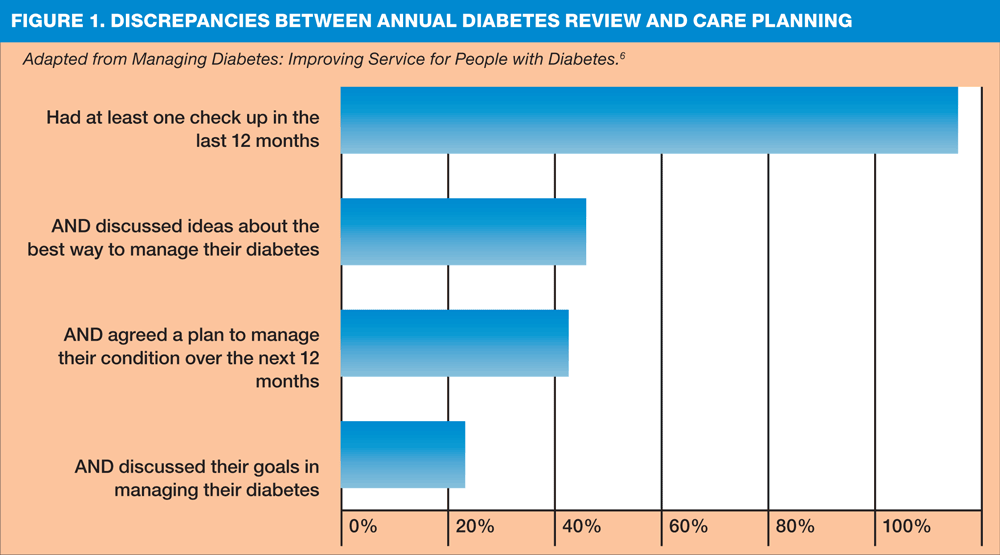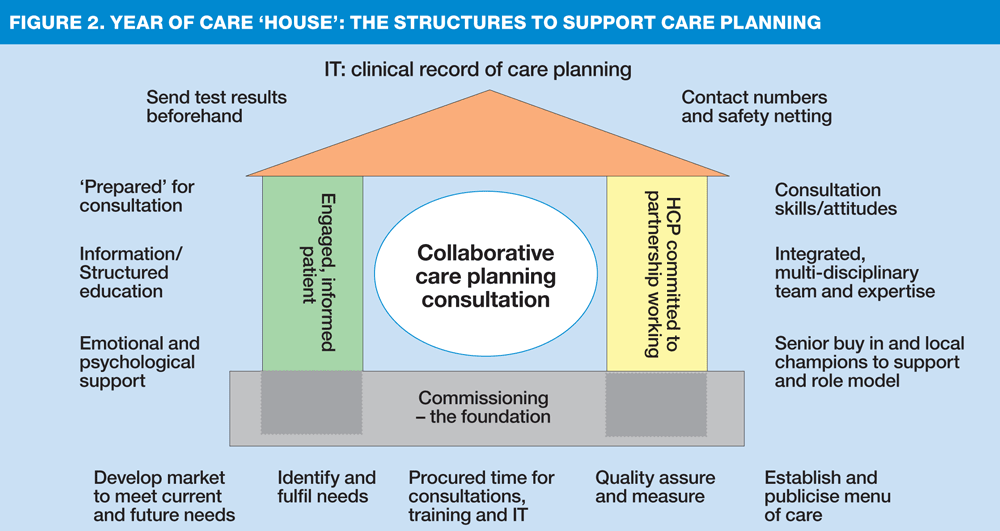Care Planning — Supporting self-management in diabetes care
Claire Scott
Claire Scott
RGN Dip in Adult Nursing
Certificate in Diabetes Care.
ENB Critical Care.
Practice Nurse and Diabetic Nurse Lead, Hungerford Surgery, Berkshire.
Project Lead for Care Planning Initiative
in Berkshire West.
Empowering individuals with diabetes to self-manage and take control of their care is not a new concept and one that most healthcare professionals aspire to achieve. However, the traditional approach to diabetic annual review is often a 'tick-box' exercise, focusing on QOF targets. So what can practice nurses do to involve patients more in their own care?
By looking 'with' rather than 'at' the person with diabetes,1 'Care Planning' puts the individual with diabetes firmly in the driving seat of their care by providing education, information and the resources in order to support self-management. This refreshing approach to diabetes care provides the opportunity for a more satisfying consultation for both the patient and the healthcare professional (HCP). It allows the individual with diabetes the opportunity to focus on their own goals and to explore what aspects of their care are important to them.
THE CASE FOR CHANGE
Since 1996 the number of people diagnosed with diabetes has increased from 1.4 million to 2.9 million. By 2025 it is estimated that five million people in the UK will have diabetes.2 Approximately 90% of these cases will be Type 2 diabetes, with rising prevalence driven by increasing numbers of overweight and obese people, as well as the ageing population.
These figures are not unfamiliar but it is always useful to re-emphasise the huge challenges we face.
As we know, good diabetes management has been shown to reduce the risk of complications, but when diabetes is not well managed, it is associated with serious complications including heart disease, stroke, blindness, kidney disease and amputations leading to disability and premature mortality.2
Central to reducing the risk of complications is the promotion of self-management. Good diabetic control is predominantly dependent on implementing day-to-day, self-management decisions. Changes in behaviour and making the right choices can only be achieved if the individual is personally motivated to do so. Care planning is about acknowledging that the person with diabetes is in charge of their own health, and therefore giving individuals the tools to self-manage their diabetes on a daily basis is crucial.
Care planning is endorsed by NICE in the national Diabetes in Adults Quality Standard, by Quality and Innovation, Prevention and Productivity (QIPP), and by the Royal College of General Practitioners.3—5
TREATING EVERYONE AS AN INDIVIDUAL.
Modern medical training embraces the goal of treating everyone as an individual, but in practical terms, we are far from achieving it. The Healthcare Commission Survey6 showed that although we are seeing up to 95% of people with diabetes for annual review, less than 50% of patients discussed a plan to manage their diabetes and less than 50% discussed personal goals for improved self-management. (Figure 1).
An individual with diabetes spends on average three hours of the year with a HCP discussing their diabetes; the other 8,757 hours are spent self-managing, but there is a lack of correlation between HCP input and individual need. In addition, the contact with the HCP tends to be decided by the health care provider rather than the individual with diabetes; contact time is not used efficiently, information and education are not prioritised as part of the care process and outcomes are poor.6
THE YEAR OF CARE PROGRAMME
A three-year pilot project was developed by the Department of Health and Diabetes UK to find ways of embedding care planning and support for self management into routine practice. It demonstrated that quality of care could be improved and a better experience for both patient and clinician could be achieved.1 As a result, the Year of Care Partnership was formed and this now provides national training, resources and support.
The Year of Care 'House' (Figure 2) illustrates the structures that need to be in place to achieve effective care planning.8
CARE PLANNING — STEP BY STEP
Step 1. Information Gathering
The initial appointment is usually completed by a trained Health Care Assistant. It incorporates all the usual measurements (blood pressure, weight, body mass index, waist circumference), smoking status, eye screening status, foot check, blood and urine collection. This provides for systematic achievement of the nine key National Diabetes Audit checks.
Step 2. Information Sharing
Information and results are collated and processed, and then distributed to individual with diabetes prior to the annual review appointment, together with supporting information to help the patient understand the results and their relevance.
Step 3. Goal Setting and Action Planning
The care planning appointment with the GP or practice nurse is where a plan for self-management can be generated. Usually one area is selected and a detailed action plan is agreed. By allowing the individual to prepare prior to attending they will already have considered aspects of their health they feel are important or would like more support with. The role of the HCP is to help build confidence to self-manage by signposting services and using consultation skills designed to build on individual strengths and increase motivation. This aspect of care planning is the most significant in supporting behaviour change.
Step 4. Review
The review time is agreed to re-visit goals and outcomes.
The traditional approach to annual review is replaced with two shorter appointments. The data collection (QOF) is moved to the initial appointment in the information gathering phase. The care is tailored to the individual and the likelihood of successful management therefore increased.
This way the target based aspect of diabetes care can be achieved without dominating quality time in the annual review. The annual review is then spent exploring individual's personal goals and increasing confidence to self-manage.
THE CONSULTATION
For both individuals with diabetes and HCPs the new approach to the annual review consultation will initially feel very different. The Care Planning training helps to explore the HCP's own values and beliefs and observe how these are often applied to our own approach to care. Issues we see as important are not necessarily the same as those that are important to the individual with diabetes.
It is important to ensure that both parties understand each other's perspective and priorities. Some patients will want to immediately focus on the results sent to them. It is useful to explain any queries with the results but also establish how they feel about certain results, what would they prefer them to be?
Using open questions, affirming, reflective listening and summarising plays an important role in building rapport and identifying issues which are important to the patient.
Goal Setting
It is then up to the individual with diabetes to decide on what their goal or aim will be.
Deciding the value or importance of the goal is essential: if it is of low importance it is less likely to be achieved. Ask the patient to score the goal between 1-10 for level of importance. If the score is less than 7, the likelihood of success is less and a new goal may need to be agreed.
Action Planning
To achieve the goal, a specific action plan needs to be agreed. For example, if the outcome is to lose 4kgs in 12 weeks, the action plan is the specific changes that need to occur in order for this to be achieved:
1. Replace mid-morning chocolate snack with fruit.
2. Take sandwiches to work/stop buying lunch from garage.
3. Join Weight Watchers (Start next Monday go with friend also has diabetes)
4. Walk to and from work (Starting Monday)
The level of confidence in achieving the action is scored in the same way as importance (0-10). Again if under 7 it is less likely to be achieved. If the score is low it is a good opportunity to explore why and consider the barriers. What needs to change in order for this to happen?
Review
An agreed review period should be agreed by both parties. This can be either telephone, email or face to face. This will be tailored to the individual and should not necessarily take the form of a 3-6 monthly 'routine' review.
HCP concerns
Working in partnership does not mean HCPs take a passive role. We still have a duty of care to highlight areas of concern, such as a high Hba1c or BP. However the style of approach is crucial and individuals will be more receptive to the concerns if they feel they have been listened to.
SUMMARY
Care planning re-addresses the balance of power between HCPs and people living with a long term condition such as diabetes. It is giving people the tools to take control of their management by providing meaningful information and education. By listening to, and acting on, the priorities of individuals with diabetes we can start to form a support system that people really want and will access.
Having adopted this refreshing approach to diabetes care personally I have been enlightened by how responsive patients have been to the simple changes in the annual review process. By giving the patient the opportunity to prepare prior to the appointment we are handing over the control to the individual, giving them the chance to develop their own approach to managing their diabetes.
To find out more about Care Planning and the YOC philosophy visit:
http://www.diabetes.nhs.uk/year_of_care/ how_to_get_going_with_care_planning
enquiries@YOC.co.uk
REFERENCES
1. Year of Care: Report of findings from a pilot programme, 2011. Available at: www.diabetes.nhs/year of care
2. Diabetes UK Prevalence Study. Diabetes in the UK: Key Statistics on Diabetes. 2012
3. National Institute for Health and Clinical Excellence (NICE) Diabetes in Adults Quality Standard. 2011. Available at: www.nice.org.uk/guidance/qualitystandards/diabetesinadults/diabetesinadults qualitystandard.jsp
4. Department of Health. Quality, Innovation and Productivity (QIPP) Workstream: Long term conditions. 2010 Available at
www.dh.gov.uk/en/healthcare/QualityandProductivity/QIPPworkstreams/DH_115448
5. Royal College of General Practitioners Care Planning — Improving the Lives of People with Long Term Conditions. 2011. Available at: www.rcgp.org.uk
6. The Healthcare Commission. Managing Diabetes: Improving Services for People with Diabetes. Service Review. 2007.
7. NHS Diabetes. 2013 Available at: http://www.diabetes.nhs.uk/year_of_care/why_year_of_care_the_case_for_change/
8. NHS Diabetes. Partners in Care: A Guide to implementing a Care Planning Approach to Diabetes Care. 2008.
Related articles
View all Articles

